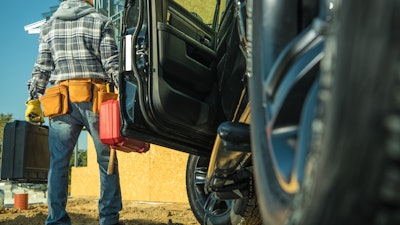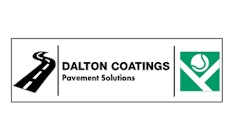
If you’re working construction, you probably have a trailer. In fact, our first purchase was a trailer to haul striping equipment – even before we bought a striping machine! You might have an enclosed trailer for striping, a sealcoat trailer, flatbed trailer, roller trailer, transport trailer, tank trailer, heavy equipment trailer… heck, you may even have an office trailer. But regardless of how many trailers you have, it will be worth your time and investment to become a “trailer maintenance master.”
As you grow, so will your fleet -- trust me. At our company we are at a point that we have so many trailers that it's near impossible to keep track. But we put in place a system that not only enables us to keep track of them but to maintain them as well.
Trailer maintenance really needs to be at the top of every contractor’s “to do” list because your paver or sealcoating rig won’t do you any good if you can’t haul it to the jobsite. A well-maintained trailer is a safer trailer, too! But for many contractors, trailer maintenance isn’t even on the radar.
I often laugh at the old days before we had a strict maintenance program. Truck glove boxes were filled with adapters for trailer lights -- and that’s even assuming we had lights on the trailers (often we would just have a pair of magnet lights). Wires were spliced so many ways all over to repair breaks, and we didn't have a clue about wheel bearings….until we lost some wheels going down the road one time.
Wow! Thinking back, we were a hot mess!
So, one of the biggest lessons that I have learned over the years – from both a safety and productivity standpoint -- is the value of trailer maintenance. I have learned that out-of-service equipment can be extremely dangerous, and that any problem, even very small issues, can wreck a whole day of work. I’m only saying it because I have been there …and done that.
Starting Our Maintenance Program
Our maintenance program initially consisted of converting all trailers to the RV7 plug. (An RV7 is a 7-way trailer wiring system that is easy to monitor and maintain, and is surface mounted so it’s easy to install without drilling holes in the equipment surface.) This alone was a huge relief -- no more adapters! I know many of you know exactly what I mean. Next, we made sure all lights were operational (you might be surprised – as we were – at how many lights trailers can have). We inspected and maintained the brakes and braking systems. We also did what so many forget, wheel packs. We pulled out the wheel bearings, and inspected and repacked or replaced the bearings.
Once we got everything in shape, we found ourselves a trailer repair mechanic and began twice-yearly service. I recommend this to everyone, even if you are just starting out: Find a good mechanic that you can develop a relationship with. You will be surprised, but there are usually mechanics around; check with trailer shops or RV dealers. Many even run a mobile service as does ours. Trust me, don’t skimp and it will save you in the long run.
Now we have our trailer mechanic inspect every trailer twice a year and handle any needed maintenance. You would think you would get on top of it eventually, but there are always things to do -- updating safety chains, replacing breakaway batteries, replacing lights, minor welding etc. And for easy checkups in between visits to the mechanic, you can purchase trailer light test boxes (Amazon has them) that will allow one man to check the lights without hooking a trailer up.
First-step Maintenance Tips
To become a “trailer maintenance master” I recommend the following:
- Convert plugs to RV7. This makes for ease of use and eliminates the need for adapters.
- Check all lighting for proper operation.
- Check brake system for proper operations
- Perform wheel packs on set schedules
- Check hitches for proper operation and wear
- Check safety chains for proper load ratings and wear
- Check the axles and springs for cracks or problems
Whether you’re a seasoned pro or the owner of a new business, don’t skimp on trailer maintenance. It’s one of the most-important safety checks you can make, it helps you maintain your productivity, and it’s one of the easier maintenance programs to set up and run – become a trailer maintenance master!











![Lee Boy Facility 2025 17 Use[16]](https://img.forconstructionpros.com/mindful/acbm/workspaces/default/uploads/2025/09/leeboy-facility-2025-17-use16.AbONDzEzbV.jpg?ar=16%3A9&auto=format%2Ccompress&fit=crop&h=135&q=70&w=240)








